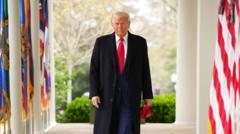President Trump is at the center of a global economic standoff as nations scramble to respond to his impending tariffs, sparking negotiations and retaliations. With allies pushing for concessions and adversaries like China threatening back-and-forth escalations, the world watches closely as markets react to his decisions.
Trump’s Tariff Showdown: Allies and Adversaries Brace for Impact

Trump’s Tariff Showdown: Allies and Adversaries Brace for Impact
As President Trump inches closer to implementing new tariffs, global leaders react with both caution and defiance, leaving markets and economies in uncertainty.
In a dramatic turn of events ahead of the imminent implementation of Donald Trump's new tariffs, the global economy hangs in the balance as countries react to the escalating situation. With Trump's "reciprocal" tariffs set to take effect, nations branded as "worst offenders" are hastily courting the White House in a bid to avert a catastrophic economic fallout. China, however, is taking a combative stance, retaliating against tariffs and declining to ease tensions.
Trump has forged ahead steadfastly, despite rising concerns from allies on Capitol Hill and the financial markets. When confronted about how steep a market decline he would accept before reconsidering his stance, he dismissed the question, reinforcing his stubborn approach. The pressing question remains: is this merely a negotiating ploy to reshape global trade dynamics, or does Trump envision a prolonged restructuring of the international economic order where the U.S. dictates terms based on favorable deals?
Israeli Prime Minister Benjamin Netanyahu was the first to visit Trump post-announcement, pledging that Israel will modify its trade policies to eliminate the deficit with the U.S., hoping to set a precedent for other nations. In tandem, Japan's Prime Minister Shigeru Ishiba has initiated negotiations with the U.S., and European leaders have extended overtures for tariff reductions, indicating a willingness to engage.
Conversely, China stands firm, announcing retaliatory tariffs in response to the U.S. increases. Trump responded with threats of additional tariffs, portraying China's resistance as a self-isolating move for the nation. As the market reacted adversely to fears of an all-out trade war leading to economic instability, influential business figures began to voice concerns against Trump's tariff initiatives for the first time.
Investors remained on alert, eagerly responding to any signs of compromise. A misunderstood suggestion of a potential tariff delay briefly spurred gains in stock markets before being quashed by the White House denial. Trump's remarks emphasized a commitment to his course, indicating there would be no pullback.
Moreover, Peter Navarro, a prominent trade advisor, reinforced the administration's stance by stating that recent diplomatic gestures from countries like Japan and Israel were merely preliminary steps, signaling a larger, unyielding vision for global trade restructuring. This introduces uncertainty around the future of the U.S. dollar and its impact on American exports, adding complexity to an already volatile situation.
As Trump approaches the critical moment for tariff implementation, the mixture of anticipation and dread reverberates across financial markets and diplomatic circles alike, embodying the unpredictable nature of his economic strategy which keeps the world guessing about the real endgame.





















